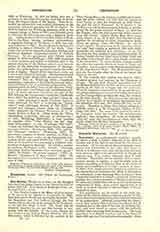

Deo Gratias ( Thanks be to God), an old liturgical formula of the Latin Church to give thanks to God for graces received. It is found in Scripture, I Cor., xv, 57, and II Cor., ii, 14.
I. Deo Gratias occurs in the Mass: (a) as an answer of the server to the Epistle or Prophecies; in High-Mass this answer should not be sung by the choir. In the Mozarabic and Old Gallican Liturgy the Deo Gratias follows the title of the Epistle or the Prophecy; at its end the Amen is said. The Greek and its daughter churches do not use this formula in connection with the Epistle. In the Latin Church the Deo Gratias is not said on Ember Saturday after the fifth lesson, which is followed by the canticle of the Three Young Men in the furnace, in order not to interrupt the sense; neither is it said after the lessons on Good Friday or after the Prophecies on Holy Saturday and the eve of Pentecost; (b) in answer to the Ite Missa est and the Benedicamus Domino, in thanks-giving for the graces received at Mass; (c) after the last Gospel; after the first Gospel the server answers Laus tibi Christe. Quarti (Rubr. Miss. Rom. Comment. illustr., 2, 12, ad 4) says, that the first Gospel signifies the preaching of Christ, wherefore we praise Christ by saying: Laus tibi Christe; the second Gospel signifies the preaching of the Apostles, wherefore only Deo Gratias is answered, but such interpretations are artificial and arbitrary; (d) in the Breviary the Deo Gratias is used more frequently; in Matins (except the last three days of Holy Week and the office of the Dead) after every lesson answering to the invocation: Tu autem Domine miserere nobis; also after the capitula, the short lesson in Prime and Compline; and in answer to the Benedicamus Domino at the close of every Hour. The Mozarabic Breviary puts the Deo Gratias after the title of the lesson, the Amen to the end.
II. The formula Deo Gratias was used in extra-liturgical prayers and customs by the Christians of all ages. The rule of St. Benedict prescribes that the doorkeeper shall say Deo Gratias, as often as a stranger knocks at the door or a beggar asks for assistance. When St. Augustine announced to the people the election of his coadjutor and successor Evodius, they called out Deo Gratias thirty-six times (St. August, Ep. ccxiii al. cx, De Actis Eraclii). In Africa it was the salutation used by the Catholics to distinguish themselves from the Donatists who said: Deo laudes (St. August, In Ps. cxxxii). Therefore in Africa Deo Gratias occurs as a Catholic name, e.g. St. Deogratias, Bishop of Carthage (453-456). The name of the deacon for whom St. Augustine wrote his treatise “De catechizandis rudibus”, was Deogratias. St. Felix of Cantalizio (1515-87) used this interjection so often, that the people called him Brother Deogratias.
F. G. HOLWECK

